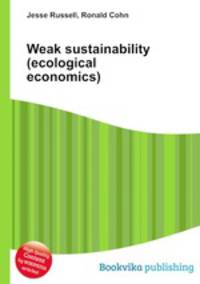Поиск книг, учебников, пособий в онлайн-магазинах

Weak sustainability (ecological economics)
Автор: Jesse Russell,Ronald Cohn, 101 стр., издатель: "Книга по Требованию", ISBN: 978-5-5083-7306-1High Quality Content by WIKIPEDIA articles! Weak sustainability is a paradigm within ecological economics which holds the position that 'human capital' is directly substitutable for 'natural capital'. It is based upon the work of Nobel Laureate Robert Solow and John Hartwick, a well-known resource economist. The theory has enjoyed increased political attention with the development of sustainable development discourse in the late 1980s and early 1990s. A key landmark in its conception was the Rio Summit in 1992 where the vast majority of nation-states committed themselves to sustainable development in signing Agenda 21, a global action plan on sustainable development. Two central paradigms of sustainable development have emerged since; these are ‘weak’ and ‘strong’ sustainability. Данное издание представляет собой компиляцию сведений, находящихся в свободном доступе в среде Интернет в целом, и в информационном сетевом ресурсе "Википедия" в частности. Собранная по частотным запросам...
Рейтинг книги: 



 5 из 5, 2 голос(-ов).
5 из 5, 2 голос(-ов).




 5 из 5, 2 голос(-ов).
5 из 5, 2 голос(-ов).




